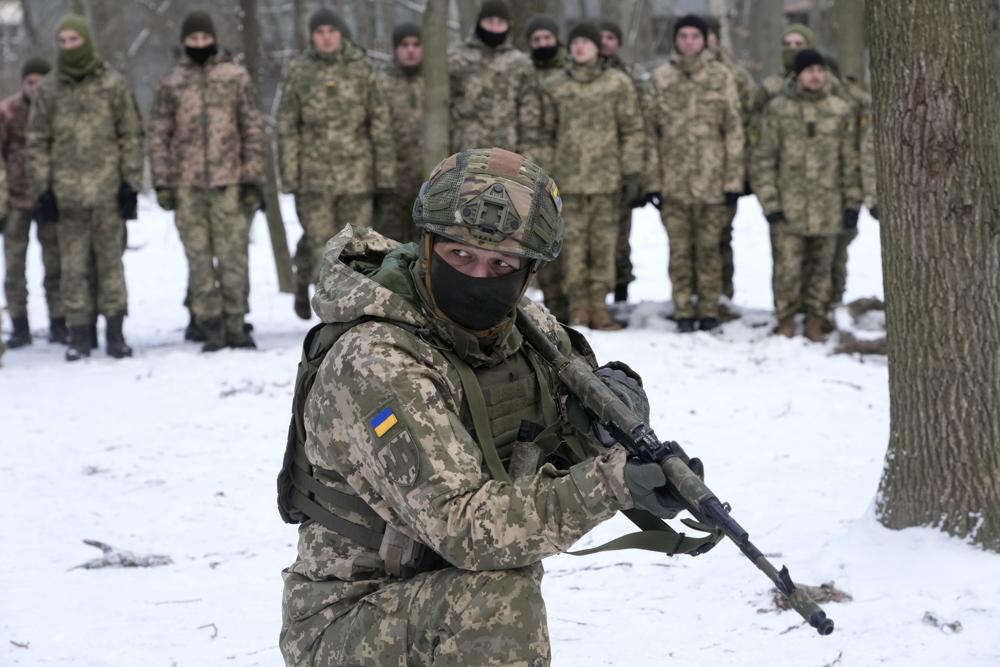

European Union foreign ministers are aiming to put on a fresh display of resolve and unity in support of Ukraine on Monday, amid deep uncertainty about whether President Vladimir Putin intends to attack Russia’s neighbor or send his troops across the border.
“All members of the European Union are united. We are showing unprecedented unity about the situation in Ukraine, with the strong coordination with the U.S.,” EU foreign policy chief Josep Borrell told reporters in Brussels.
Asked whether the EU would follow a U.S. move and order the families of European embassy personnel in Ukraine to leave, Borrell said: “We are not going to do the same thing.” He said he is keen to hear from Secretary of State Antony Blinken about that decision.
During Monday’s meeting, which Blinken will attend virtually, the ministers will restate Europe’s condemnation of the Russian military build-up near Ukraine, involving an estimated 100,000 troops, tanks, artillery and heavy equipment, diplomats and officials said ahead of the meeting.
They’ll renew calls for dialogue, notably through the European-backed “Normandy format,” which helped to ease hostilities in 2015, a year after Putin ordered the annexation of Ukraine’s Crimean Peninsula. Fighting in eastern Ukraine has killed around 14,000 people and still simmers today.
Should Putin move on Ukraine again, the ministers will warn, Russia would face “massive consequences and severe costs.” Those costs would be of a financial and political nature. The EU insists that it stands ready to slap hefty sanctions on Russia within days of any attack.
“We don’t know what the Russians are going to do, but what we are talking about is basically the most important security development in Europe since the end of the Cold War,” a senior EU official said. “The response of the European Union will be at the level of the challenge.”
The official and diplomats briefed reporters on the condition of anonymity so that they could speak more freely about the meeting preparations.
Over the weekend, some of the member countries closest to Russia — Estonia, Latvia and Lithuania — confirmed that they plan to send U.S.-made anti-tank and anti-aircraft missiles to Ukraine, a move endorsed by the United States.
But questions have been raised about just how unified the EU is. Diverse political, business and energy interests have long divided the 27-country bloc in its approach to Moscow. Around 40% of the EU’s natural gas imports come from Russia, much of it via pipelines across Ukraine.
Gas prices have skyrocketed, and the head of the International Energy Agency has said that Russian energy giant Gazprom was already reducing its exports to the EU in late 2021 despite high prices. Putin says Gazprom is respecting its contract obligations, not putting the squeeze on Europe.
The EU’s two major powers appear most cautious. Germany’s Nord Stream 2 pipeline from Russia, which is complete but yet to pump gas, has become a bargaining chip. French President Emmanuel Macron has renewed previously rejected calls for an EU summit with Putin.
Late last year, France and Germany initially expressed doubts about U.S. intelligence assessments that Moscow might be preparing to invade.
Late on Saturday, the head of the German navy, Vice Admiral Kay-Achim Schoenbach, resigned after coming under fire for saying that Ukraine would not regain the Crimean Peninsula, and for suggesting that Putin deserves “respect.”
Hungarian Prime Minister Viktor Orban plans to meet with Putin next week to discuss a Russian-backed project to expand a Hungarian nuclear power plant.
Still, diplomats and officials said hard-hitting sanctions are being drawn up with the EU’s executive branch, the European Commission. But they were reluctant to say what the measures might be or what action by Russia might trigger them.
The aim, they said, is to try to match the doubts Putin has sowed about his intentions for Ukraine with uncertainty about what any retaliatory European action might look like, or when it would come.
One diplomat refused to discuss the matter at all. Another suggested that a layered response might be in preparation, with different levels of retaliation depending on whether a cyberattack, rocket strike, or all-out invasion was launched.
A third was confident there would be no arguments over the trigger point, saying: “We’ll know it when we see it.”
For now, though, the Europeans must wait and see whether Putin is satisfied with progress in talks with the United States, coordinate with Blinken on a response should things go wrong, and bank on the economic deterrent posed by the EU being Russia’s biggest trading partner.